🎗️Lonny's War Update- October 597, 2023 - May 25, 2025 🎗️
🎗️Day 597 that 58 of our hostages are still
Israelis rallying around country for hostage deal as Doha negotiations hit impasse
Annual march in Kiryat Bialik held in honor of hostage soldier Matan Angrest: ‘We won’t stop praying that he march alongside us here soon
Protesters at Habima Square in Tel Aviv lighting their flashlights as they send a prayer for the safety of hostages in Gaza, May 17, 2025 (Adar Eyal)Israelis were readying to hold rallies around the country on Saturday night to call for a deal for the release of hostages held by Hamas in Gaza, as negotiations in Doha have stalled and reached an impasse.
At Habima Square in Tel Aviv, the anti-government rally will begin at 7:00 p.m. and will be headlined by activist lawyer Eliad Shraga.
Afterward, a protest led by the Hostages and Missing Families Forum is expected to be held outside the Kirya military headquarters.
Additional demonstrations are planned across the country, including in Jerusalem, where a march will begin at 8:30 p.m. in Zion Square and proceed to a rally at Paris Square, near the prime minister’s official residence.
Earlier Saturday, thousands marched in Kiryat Bialik calling for the release of Matan Angrest, an IDF soldier and resident of the Haifa suburb, who was kidnapped by Hamas on October 7, 2023, and remains in captivity.
Angrest’s mother, Anat, gave a speech at the march, which has been held in Kiryat Bialik annually for the past 42 years: “This was a moving morning. Seeing thousands of marchers who came to identify and demand his release — strengthens and gives hope. Your support gives us the strength to continue working for his return. We won’t stop praying that he march alongside us here soon,” she said.
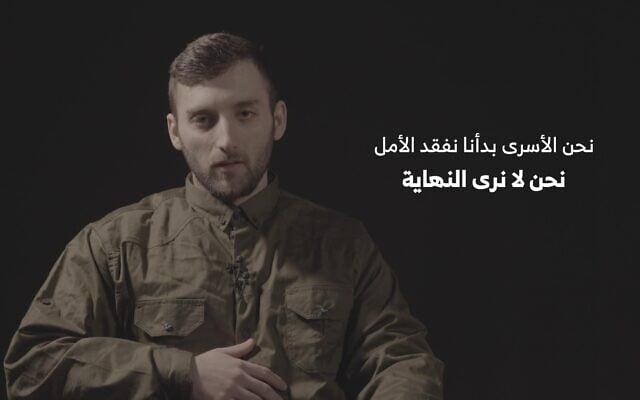 Hostage Matan Angrest is seen in a propaganda video published by Hamas on March 7, 2025. (Screenshot: Telegram)
Hostage Matan Angrest is seen in a propaganda video published by Hamas on March 7, 2025. (Screenshot: Telegram)On Thursday, Prime Minister Benjamin Netanyahu recalled the remaining members of Israel’s hostage negotiating team from Doha after recalling the team’s high-ranking members for consultations after a week of “intensive” negotiations.
The announcement followed reports that the renewed ceasefire and hostage deal talks in Qatar, which began last week following the release of Israeli-American hostage Edan Alexander, had yet to make any progress.
Terror groups in the Gaza Strip are holding 58 hostages, including 57 of the 251 abducted by Hamas-led terrorists on October 7, 2023.
They include the bodies of at least 35 confirmed dead by the IDF, and 20 are believed to be alive. There are grave concerns for the well-being of three others, Israeli officials have said.
Hamas released 30 hostages — 20 Israeli civilians, five soldiers and five Thai nationals — and the bodies of eight slain Israeli captives during a ceasefire between January and March, and one additional hostage, Alexander, in May as a “gesture” to the United States.
The terror group freed 105 civilians during a weeklong truce in late November 2023, and four hostages were released before that in the early weeks of the war. In exchange, Israel has freed some 2,000 jailed Palestinian terrorists, security prisoners, and Gazan terror suspects detained during the war.
Eight hostages have been rescued from captivity by troops alive, and the bodies of 41 have also been recovered, including three mistakenly killed by the Israeli military as they tried to escape their captors, and the body of a soldier who was killed in 2014.
The body of another soldier killed in 2014, Lt. Hadar Goldin, is still being held by Hamas and is counted among the 58 hostages.
Ex-hostage Naama Levy tells rally her greatest fear in captivity was IDF airstrikes
‘I was convinced every single time that I was finished,’ former captive says of Israeli bombings, as she addresses thousands-strong crowd; hundreds at vigil for killed Gaza children
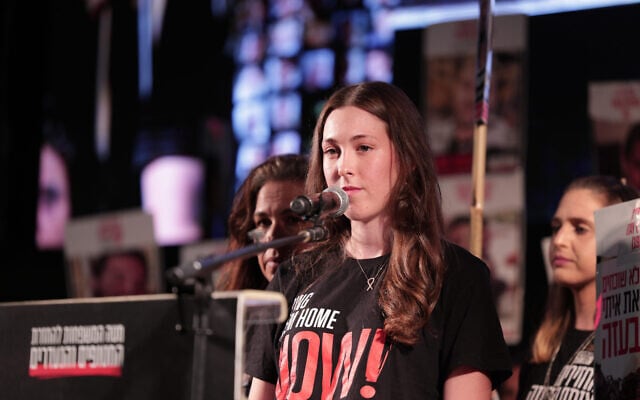 Released hostage Naama Levy speaks at Tel Aviv's Hostages Square, on May 24, 2025. (Alon Gilboa/Pro-Democracy Protest Movement
Released hostage Naama Levy speaks at Tel Aviv's Hostages Square, on May 24, 2025. (Alon Gilboa/Pro-Democracy Protest MovementThousands gathered in cities across the country Saturday night for anti-government rallies and hostage demonstrations, as relatives of captives pleaded with the government to agree to a deal to release them as part of a ceasefire in Gaza.
The main rally focused on opposition to the government took place at Tel Aviv’s Habima Square, where demonstrators gathered to demand an end to the war and new elections, while decrying the burden of the war on reservists as ultra-Orthodox Yeshiva students continue to largely evade military recruitment.
Meanwhile, with negotiations in Qatar again seeming to have stalled, protesters demanding a hostage deal gathered at nearby Hostages Square outside the Tel Aviv Museum, where a former captive told the crowd that her greatest terror in captivity was Israeli strikes, adding that she feared for the lives of the remaining hostages held in Gaza.
Terror groups in the Gaza Strip are holding 58 hostages, including 57 of the 251 abducted by Hamas-led terrorists on October 7, 2023.
Naama Levy, one of five IDF female surveillance soldiers released in the recent ceasefire-hostage deal in January, told the crowd of some 1,500 people: “They come by surprise.”
“First you hear a whistle, pray it doesn’t fall on you, and then — the booms, a noise loud enough to paralyze you. The earth shakes.”
“I was convinced every single time that I was finished, and it’s also what put me in the greatest danger: one of the bombardments collapsed part of the house I was in,” she said. “The wall I was leaning on didn’t collapse, and that’s what saved me.”
She added: “That was my reality, and now it’s their reality. At this very moment, there are hostages who hear those same whistles and booms, shaking with fear. They have nowhere to run, they can only pray and cling to the wall while feeling a horrible powerlessness.”
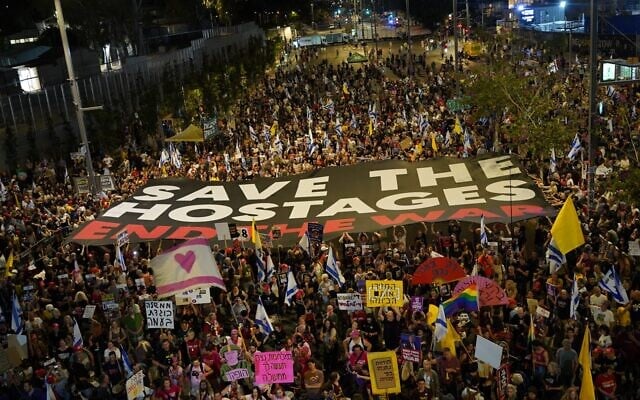 Protesters demand a hostage deal and an end to the war in the Gaza Strip at a demonstration on Begin Street, Tel Aviv, May 24, 2025. (Dana Reany/Pro-Democracy Protest Movement)
Protesters demand a hostage deal and an end to the war in the Gaza Strip at a demonstration on Begin Street, Tel Aviv, May 24, 2025. (Dana Reany/Pro-Democracy Protest Movement)She said that in her first few weeks in captivity, she was held alone, “just me and my captors, constantly on the run.”
“There were entire days without food and little water. One day, I had nothing left, not even water. Fortunately, it started raining. My captors put a pot outside the house where I was held, and the rain filled it,” she said. “I drank that rain water, which was enough for a pot of rice. That’s what kept me going.”
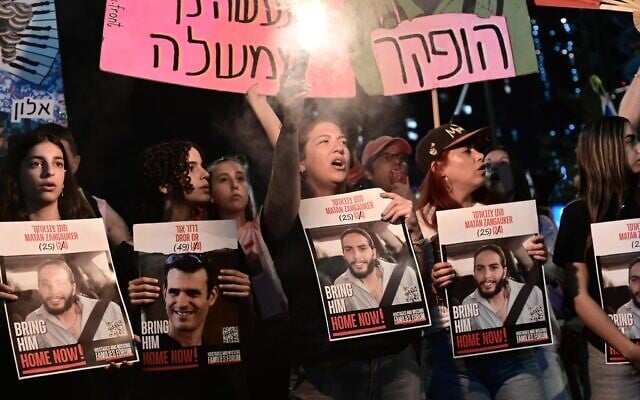 Demonstrators protest against the Israeli government and for the release of held hostage in the Gaza Strip, in Tel Aviv, May 24, 2025. (Tomer Neuberg/Flash90 )
Demonstrators protest against the Israeli government and for the release of held hostage in the Gaza Strip, in Tel Aviv, May 24, 2025. (Tomer Neuberg/Flash90 )Levy added that in captivity, she didn’t believe anyone in Israel could be aware of what the hostages were experiencing and still be willing to keep them in Gaza.
“But then the first hostages came back, and they said what was happening there,” she said. “They told the truth. That truth wasn’t enough.”
Levy said the protests for the hostages gave her great solace in captivity.
“During that terrible and unimaginable time, they told us that we had been forgotten — but I didn’t believe it. I knew people were fighting for me, because on Saturday nights, when I was allowed to watch television — I saw you, in this square. There, in captivity, I saw thousands standing here wrapped in flags, shouting, singing, holding pictures of the hostages, including mine. You made me feel that I was not forgotten.”
Before the rallies, a group of hostages’ families highly critical of the government held their weekly press conference in Tel Aviv, blasting Prime Minister Benjamin Netanyahu for continuing the war, and expressing concern over his plan to appoint a Shin Bet chief who has reportedly expressed opposition to a hostage deal.
Einav Zangauker, whose son Matan is held hostage in Gaza, said of Netanyahu: “An eternal, politically-motivated war is preferable [to him] over the return of civilians kidnapped on his watch.
“He prefers to flatten Gaza indefinitely, even at the price of 58 Ron Arads,” she said, referring to an Israeli pilot, presumed dead, who went missing in action in 1986 and whose whereabouts remain unknown nearly 40 years later.
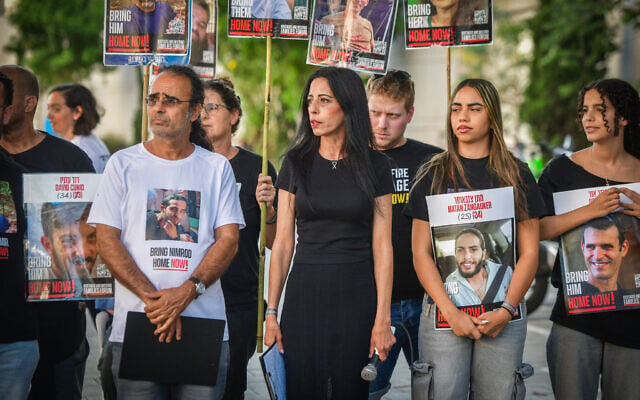 Families of Israelis held hostage in Gaza hold a press conference in Tel Aviv on May 24, 2025. (Avshalom Sassoni/Flash90)
Families of Israelis held hostage in Gaza hold a press conference in Tel Aviv on May 24, 2025. (Avshalom Sassoni/Flash90)Yehuda Cohen, whose son Nimrod is held in Gaza, accused Netanyahu of evading responsibility. “How is it that after 600 days, he proposes a selective deal?” He said, in reference to a potential agreement that would see only some hostages brought back. “This is a death sentence for whoever is left behind. I call upon President Trump — only you can stop this disaster and return everyone home.”
At an anti-government rally on Begin Road in Tel Aviv, protesters marched by IDF Headquarters, banging drums, lighting flairs and chanting, “Why are they still in Gaza?”
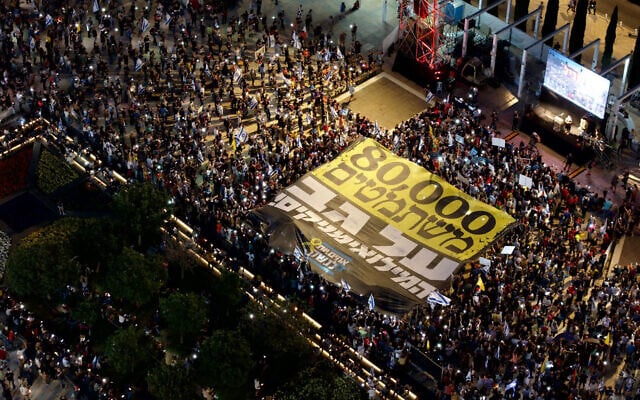 Anti-government protesters at Habima Square carry a banner reading, “80,00 are shirking their duty, riding on the backs of the reservists,” in Tel Aviv, May 24, 2025. (OM/Pro-Democracy Protest Movement)
Anti-government protesters at Habima Square carry a banner reading, “80,00 are shirking their duty, riding on the backs of the reservists,” in Tel Aviv, May 24, 2025. (OM/Pro-Democracy Protest Movement)Referring to Netanyahu’s controversial claim this week that Hamas used “flip-flops and AK-47s” in the onslaught of October 7, 2023, Cohen said, incredulously, that the premier seemed to think his son Nimrod’s tank “was taken over with flip-flops.”
Zangauker said that instead of reaching a ceasefire-hostage deal, the government “will continue sending our troops to the front, to create settlements on the backs of our hostages. They’ll continue sabotaging the country and shirking responsibility.
“In order to reach a deal that will release all the hostages, we have to kick out this government,” she said.
Anti-government protesters demand the release of hostages from Gaza, in front of the Begin Street entrance to the IDF headquarters in Tel Aviv.
The Begin Road protest, which appeared to draw some 1,000 people at its peak, was bolstered by protesters from the earlier anti-government demonstration at Habima Square.
On Kaplan Street, in between the two protests, left-wing activists stood in silence, holding up candles and pictures of children killed by Israel in Gaza since the fighting was renewed on March 18.
Most of the photos featured the name of a slain child, as well as the date and place of their death.
Activists hold up photos of children killed during the war in Gaza, during a protest calling to end the war, in Tel Aviv, May 24, 2025. (Tomer Neuberg/Flash90)The silent anti-war demonstration, which positions itself outside IDF Headquarters’ southern gate, was noticeably larger this week than in past weeks, with about 400 participants.
Activists hold up photos of children killed during the war in Gaza, during a protest calling to end the war, in Tel Aviv, May 24, 2025. (Tomer Neuberg/Flash90)
This week’s protest came after Democrats party chair and former IDF deputy chief Yair Golan sparked controversy by saying the Israeli government was “killing babies as a hobby in Gaza.”
Golan later stressed that his comments had been directed at the government, not the military, and that “our mission is to ensure that Israel remains a sane country that does not kill children either as a hobby or as a policy.”
Demonstrators protest against the Israeli government and for the release of hostages in the Gaza Strip, Tel Aviv, May 24, 2025. (Tomer Neuberg/Flash90)
His comments were widely condemned by figures across the political spectrum.Demonstrators protest against the Israeli government and for the release of hostages in the Gaza Strip, Tel Aviv, May 24, 2025. (Tomer Neuberg/Flash90)
According to a recent list issued by the Hamas-run Gaza health ministry, 16,503 children and teenagers aged 0–18 have been killed as a direct result of the war in Gaza, meaning as a result of gunfire and bombings.
These figures are part of the more than 53,000 people that the Hamas-run ministry says have been killed or are presumed dead in the fighting so far, though the toll cannot be verified and does not differentiate between civilians and fighters.
Hamas and other terror groups are known to regularly employ older teens as operatives and gunmen.
The war broke out on October 7, 2023, when Hamas-led terrorists invaded Israel, killing some 1,200 people, mostly civilians, and kidnapping 251.
Israel says it has killed some 20,000 combatants in battle as of January and another 1,600 terrorists inside Israel on October 7. Link
Thousands rally in Tel Aviv calling for end to war, return hostages
Protesters demand Gaza ceasefire, level sharp criticism at Netanyahu over Shin Bet chief appointment; speakers call for general strike and unity among opposition leaders
Thousands gathered Saturday evening at Tel Aviv’s Habima Square for a rally demanding an end to the war in Gaza and the return of all hostages held by Hamas.The protest featured fierce criticism of Prime Minister Benjamin Netanyahu’s government, particularly in light of his announcement appointing Maj. Gen. David Zini as the next head of Israel’s internal security service, the Shin Bet.The demonstration, organized by groups advocating for government accountability and hostage release, concluded with participants marching toward the nearby Begin Gate for a continued protest.Thousands gather Saturday evening at Tel Aviv’s Habima Square for a rally demanding an end to the war in Gaza and the return of all hostages held by Hamas (Photo: Zohar Ben Yehuda)
- Shin Bet chief nominee ‘takes the hostages less into account,’ security official tells Channel 12
Channel 12 reports additional information showing that Prime Minister Benjamin Netanyahu’s designated Shin Bet chief prefers continued war against Hamas in Gaza over a deal to return hostages.
According to the report, Zini expressed anger at then-IDF chief of staff Herzi Halevi at an IDF Southern Command meeting last year, stating: “You are preferencing the return of hostages over the elimination of Hamas.”
A security official present at IDF General Staff meetings tells Channel 12 explicitly that Zini “takes the hostages less into account,” adding that while the military carries out operations to avoid hurting hostages, for him, “it is no parameter.”
Another source says Zini’s views are known, and while he is usually the minority in the room without much influence, as chief of the Shin Bet, “this would not be the situation.
Channel 12 reported Friday night that Zini, whose appointment Netanyahu announced Thursday in defiance of the attorney general, had reportedly said to colleagues in the military: “I’m against hostage deals. This is an eternal war.” The network also reported that Netanyahu selected Zini after a brief, impromptu conversation that went behind the back of IDF chief Lt. Gen. Eyal Zamir.
Hostages families: Netanyahu prefers an eternal political war over the return of hostages taken on his watch
A group of hostages’ families holds a weekly press conference in Tel Aviv, blasting Prime Minister Benjamin Netanyahu for continuing the war, and expressing concern over his appointment of a Shin Bet chief who has reportedly expressed opposition to a hostage deal.
Einav Zangauker, whose son Matan is held hostage in Gaza, says of Netanyahu: “An eternal political war is preferable over the return of civilians kidnapped on his watch.
“He prefers to flatten Gaza indefinitely, even at the price of 58 Ron Arads,” she says, referring to an Israeli pilot, presumed dead, who went missing in action in 1986.
Zangauker also expresses concern over Netanyahu’s appointment of Maj. Gen. David Zini as Shin Bet chief, amid reported comments that he opposed a deal to return hostages.
Yehuda Cohen, whose son Nimrod is held in Gaza, accuses Netanyahu of evading responsibility. “How is it that after 600 days, he proposes a selective deal? This is a death sentence for whoever is left behind. I call upon President Trump — only you can stop this disaster and return everyone home.”
Gil Dickman, whose cousin was murdered in captivity, says that military pressure “killed hostages,” and urged Netanyahu, “Don’t appoint a Shin bet chief who will turn the service into a hostage-burying service. End the war — and bring everyone back now.”
Here is the full, word-for-word translation of the article including all photo captions:
"Demanding to return to the negotiating table": the families' rally at the Hostages Square
Ahead of the 600th day of the war: The Hostages Families Headquarters at a rally in the square: "We demand that the decision-makers return to the negotiating table and not get up from it until an agreement is reached that will bring everyone back" • Survivor of captivity Naama Levy spoke for the first time at the square and told: "Part of the house collapsed, I drank rainwater and that is what kept me going"Demonstration at Hostages Square | Photo: Marcelo Schneiderman
Against the backdrop of the return of the Israeli delegation from the negotiation talks in Doha, the uproar over the announcement of the appointment of the new Shin Bet head, Major General Zini, and ahead of the week in which we will mark the 600th day of the war, the Hostages Families Headquarters held this evening (Saturday) a rally at the Hostages Square in Tel Aviv, as well as additional demonstrations across the country. At the Tel Aviv rally, among others, Einav Tzangauker, mother of the hostage Matan, and captivity survivor Naama Levy spoke. At the same time, at Habima Square in the city, another protest by the 'Free in Our Land' headquarters is taking place.
Demonstration at Hostages Square | Photo: Daphna YoshuaDemonstration against the government at Habima Square (Photo: Zohar Bar-Yehuda)"I am Naama Levy. On the seventh of October I was kidnapped to Gaza from the Nahal Oz post. I was held in Hamas captivity for 477 hard and unbearable days," said the captivity survivor in her speech at the square. Later in her words, she spoke about the difficult days in captivity: "In the first weeks in captivity I was alone. Just me and my guards. In constant flight, in deadly fear. Sometimes whole days without food, and little water."
Naama Levy: "Part of the house collapsed, I drank rainwater"
"One day, I had nothing left. Not even water. Luckily, it started to rain. My captors placed a pot outside the house where I was held, and the rain filled it. I drank from this rainwater, which was also enough for a pot of rice. And that is what kept me going. But more than anything, I was frightened by the bombings," shared Levy. "They come suddenly, at first you hear the whistles, you pray it won’t fall on us, and then – the explosions, noise with a force that paralyzes the body, and the ground that shakes."
"Every time I was sure this was my end," said Levy. "It is one of the scariest things I experienced there. And it is also what endangered me more than anything: in one of the bombings, part of the house I was in collapsed. Luckily – the wall I leaned on did not collapse, and that is what saved my life. That was my reality. That is now their reality."
Captivity survivor Naama Levy at Hostages Square | Photo: Alon Gilboa
She also told that during captivity they were told they had been forgotten: "During this terrible and incomprehensible period, we were told that we were forgotten. But I did not believe it. I knew they were fighting for me. I knew they were fighting for me because I saw you – in this square. So I want to tell you thank you. Deep thanks. And also ask you for a request: keep coming. Keep hugging and strengthening those who are still there. You have no idea how much strength it gives – and how much hope it gave me."
"On Monday, after I received the intelligence photo of my Matan, I could not stand on my feet. I collapsed. I could not eat for an entire day, I struggled to breathe," said Tzangauker in her speech at the square. "Almost 600 days that my son is being tortured in Hamas captivity. Sits in a corner next to a wooden table in a tunnel and cannot eat, because of stomach cramps. He barely speaks because of depression, struggles to hold a glass of water due to muscular dystrophy."
Einav Tzangauker at Hostages Square | Photo: Paulina Patimer
Tzangauker: "Mr. Prime Minister – how do you look in the mirror?"
Later in her speech, she addressed Netanyahu and said: "Tell me Mr. Prime Minister: how do you go to sleep at night and wake up in the morning – how do you look in the mirror knowing that you are abandoning 58 hostages and mistreating their families? You dismantled an entire country for what? Coalition integrity? A padded and comfortable chair? You are tearing us families apart. Tearing."
"Matan, my beloved, I believe with all my heart that you hear me," she said at the end of her speech. "Know that your mother is fighting for you, day and night, mother will fight until you return, you and all the other hostages. Natali, Shani, Ilana and all of us are waiting for you with a big hug and food and everything you ask for. We are fighting, not stopping and not slowing down until you return."
Rally at Hostages Square | Photo: Paulina Patimer
Liran Berman, brother of Gali and Ziv who were kidnapped on the Black Saturday from their home in Kibbutz Kfar Aza, also spoke at the square: "I have a confession: I did not want to come up and speak here this evening. I was hesitant. I was afraid. Maybe they’ll also call me 'crazy'? Maybe they’ll also say about me that I’m brainwashed? Maybe they’ll say again that 'this is not the most important issue'? But I am here, and I am here because my two siblings, my best friends, my support, my home – both of them are not here and I cannot allow myself to stay silent any longer."
Liran Berman, brother of Gali and Ziv Berman at Hostages Square | Photo: Paulina Patimer
He also said: "Before the Government of Israel and its leader there is a clear choice: a deal or war. Saving lives or abandonment. I, you, an overwhelming majority of the public, say to you, Mr. Prime Minister: we are not against you, we are for a deal. We are not against victory – because there is no victory without the return of the hostages."
Nira and Ofir Sharabi, the widow and daughter of Yossi Sharabi, said at the rally: "All at once is the saving of lives of all those who survive in captivity for so long, with endless heroism and courage, second by second. All at once is giving final and necessary respect to those who were murdered in terrible ways and whose families are waiting for them so much. All at once is finally beginning to treat the wounds that still cannot heal. All at once is masses of Israelis who know their country did the right thing. As long as our Yossi is there – the hell is still here. I call from here to the Government of Israel – let this nightmare end. All at once."
At the demonstration at Habima Square, Lieutenant Colonel (res.) Oren Shvil, one of the leaders of Brothers in Arms, spoke and addressed the head of the IDF Manpower Directorate: "How will you look in the eyes of a young guy from Modi'in who has been in Gaza for 200 days, when you did not send a draft notice to his neighbor from Modi'in Illit?"
At a statement by the hostages' families earlier this evening, Einav Tzangauker, mother of the hostage Matan, said: "Netanyahu wants to appoint as head of the Shin Bet a man who says he is against returning my son. This is not humane, not Jewish, and will not pass. Remember this moment because it will be remembered for generations. The Government of Israel and its head knowingly say that they want to give up on our son."
Einav Tzangauker in the statement of the hostages' families
Yehuda Cohen, father of Nimrod Cohen, added: "Upon our return we heard that Netanyahu is belittling the October 7 massacre into an event of flip-flops and Kalashnikovs. He is fleeing responsibility, disgracing the fighters who fought bravely among them our son Nimrod. Instead of returning him, he sends soldiers to a war that will kill him. How after nearly 600 days does Netanyahu place on the table a selection deal. The military pressure led to the death of 41 days in captivity."
Yehuda Cohen in the statement of the hostages' families
According to him, intensifying the war will make the living and the fallen disappear "and turn them all into Ron Arads." He further claimed that "the war serves only Netanyahu. In order to prevent the killing of the hostages I am absurdly forced to once again turn to Trump: you are the only one who can force Netanyahu to end the war. We must save them all. Netanyahu is dragging us to disaster."
From the Families Headquarters it was stated: "We demand that the decision-makers return to the negotiating table and not get up from it until an agreement is reached that will bring everyone back – the living for rehabilitation and the dead for proper burial. Only a comprehensive agreement will bring Israeli victory and revival. We will return, we will rise."
Incoming Shin Bet head Zini: "I am against hostage deals, this is an eternal war"
Heavy criticism is being directed at the skills and capabilities of Major General David Zini, who was appointed on Thursday by the Prime Minister as head of the Shin Bet. Last night on "Friday Studio" we revealed for the first time that in closed discussions in the General Staff, Zini expressed a firm stance against hostage deals.
Sources speaking with N12 say that Zini expressed his position in General Staff meetings during the past year, during periods when negotiations for a hostage deal were on the table and discussed. His position was not a one-time statement, but he repeated it on several occasions and before senior IDF officials.
"I am against hostage deals, this is an eternal war" – so said Zini in the General Staff discussions. Sources who spoke with N12 say that this sentence, which echoed in the room, was less important when Zini was serving as commander of the General Staff Corps and commander of training and instruction, but it is a significant sentence if he is indeed appointed as head of the Shin Bet officially.
After the exposure on "Friday Studio," hostages' families responded with outrage to the statements. Vicki Cohen, mother of kidnapped soldier Nimrod Cohen, said that upon hearing the statements they "pulled out their hair" and linked Zini's appointment as head of the Shin Bet to that of Minister Ron Dermer as head of the negotiation team in Doha.
In an official statement from the Hostages Families Headquarters, it was written that the hostages' families are "outraged" at the statements attributed to him. "If the publication is correct, these are horrifying statements and deserving of all condemnation coming from someone who is about to determine the fates of the hostages," the headquarters added.
Impact on the negotiations for a hostage deal
The Shin Bet is an integral part of the negotiations for a hostage deal, it is present at all meetings, decides on the list of terrorists and prisoners to be released, and is supposed to provide a professional opinion to the government on this issue.
When the incoming head of the Shin Bet says he is against hostage deals in principle, and that the war ahead is an eternal war in his view, it is a detail that is important for the Israeli public, certainly for the families of the hostages, to know. This stance may affect how the Shin Bet will approach future negotiations, the level of commitment to advancing them. link
**There is nothing more important than getting them home! NOTHING!**
“I’ve never met them,But I miss them. I’ve never met them,but I think of them every second. I’ve never met them,but they are my family. BRING THEM HOME NOW!!!”
There is no victory until all of the hostages are home!אין נצחון עד שכל החטופים בבית
Red Alerts - Missile, Rocket, Drone (UAV - unmanned aerial vehicles), and Terror Attacks and Death Announcements
*10:50am-Jerusalem and Central Israel areas -ballistic missile from Yemen- successfully intercepted- no reports of injuries or damages
- Gaza doctor's nine children killed in IDF strike on Khan Yunis home - reportNine of a Gaza doctor's children were killed in an Israeli strike on their home on Friday night, Israeli media reported on Saturday.Dr. Alaa al-Najjar, a pediatrician, was working at the al-Tahrir Clinic at the time of the attack on her southern Khan Yunis home.
The IDF has not responded to the event.
This is a developing story - IDF Responds to Reports of Child Casualties in Khan Yunis: 'Examining Civilian Impact'The IDF has addressed international reports regarding the Israeli strike in Khan Yunis in which nine children were killed, stating that the attack targeted suspects identified by forces who were operating in a nearby building in the city. The IDF reported that the army had evacuated the Khan Yunis area due to it being a 'dangerous combat zone.' They further stated that 'claims of civilian casualties are being examined.
IDF says it is probing drone strike that reportedly killed 9 children in Gaza
The IDF says it is investigating a drone strike it carried out last night in southern Gaza’s Khan Younis that reportedly killed nine children.
According to Palestinian media, the strike hit a home in Khan Younis, killing nine children of the same family, all under the age of 12. The father of the family and one of the children, aged 11, were seriously wounded. The mother, Alaa Najjar, a pediatrician at Nasser Hospital, was on duty at the time of the strike.
In response to the reports, the IDF confirms it carried out a strike in Khan Younis, saying it targeted several suspects identified at a building close to where ground troops were operating.
“The Khan Younis area is a dangerous combat zone which the IDF ordered civilians to evacuate for their safety before the start of the troops’ operation,” the military says, referring to its warning on Monday.
- Hamas Sources: Organization Faces Unprecedented Economic Crisis, Struggles to Govern Gaza
Gaza and the South
Hamas facing worst financial crisis ever amid Gaza governance crisis
Hamas fighters reportedly unpaid for nearly 3 months, face military gear shortages; sources describe leadership vacuum in Gaza’s Hamas-run government terror group struggles to fill after series of Israeli assassinations
Hamas is facing the worst financial crisis in its history, with government employees in Gaza receiving just 900 shekels (approximately $250) a month for the past four months, according to a report published Saturday by the Saudi-owned daily Asharq Al-Awsat.The ongoing salary delays and cuts have intensified already dire living conditions in the Hamas-controlled enclave.Sources within Hamas told the paper that the organization is struggling not only to pay civil servants but also members of its military wing, the Izz ad-Din al-Qassam Brigades, and other affiliated institutions across all ranks. Funding for social services and various ministries has reportedly been nearly suspended for over four months, severely limiting public services tied to the group.The Qassam Brigades, the report noted, have not paid fighters for approximately three months and are facing acute shortages of military supplies. Families of deceased and wounded Hamas members are also reportedly no longer receiving consistent support, a shift from earlier in the war.Administratively, a leadership vacuum has emerged in Gaza’s Hamas-run government. The sources said the group is struggling to fill key roles due to Israel's targeted strikes on anyone perceived to be attempting to restore or facilitate government operations. Despite these challenges, Hamas’ military command structure reportedly continues to function, though operational difficulties persist in northern and southern Gaza due to ongoing Israeli actions.These reports follow a Wall Street Journal article last month that cited intelligence sources as saying Hamas was nearly bankrupt after sustained Israeli strikes and a halt in humanitarian aid — which has since resumed. According to those sources, many government employees stopped receiving wages, and even senior Hamas officials saw their pay halved during Ramadan.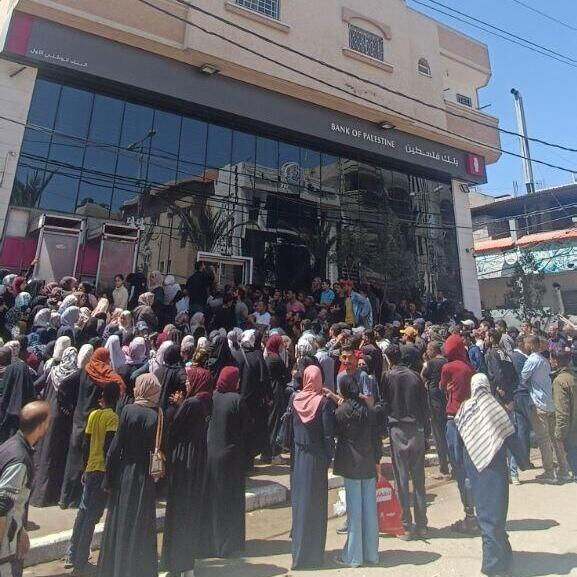 Crowds outside Bank of Palestine in GazaThe shortage signals a profound organizational dysfunction inside the terrorist group, which is now dealing with renewed fighting and is having difficulty recruiting "fighters" without payment.Before the war, Hamas reportedly received $15 million in monthly cash transfers from Qatar, which also raised funds for the group in West Africa, South Asia and the United Kingdom. Arab and Western officials say much of Hamas’ reserve funds, estimated at $500 million, are currently held in Turkey.Since the outbreak of the war, Israel has restricted physical cash flows into Gaza. Palestinian sources told the Wall Street Journal that Hamas was involved in seizing approximately $180 million from Palestinian bank branches across the enclave. The group had previously supplemented its income through customs duties at crossings, taxes on merchants and trade operations using foreign cash to import goods for resale inside Gaza.Hamas has not publicly responded to the latest claims.
Crowds outside Bank of Palestine in GazaThe shortage signals a profound organizational dysfunction inside the terrorist group, which is now dealing with renewed fighting and is having difficulty recruiting "fighters" without payment.Before the war, Hamas reportedly received $15 million in monthly cash transfers from Qatar, which also raised funds for the group in West Africa, South Asia and the United Kingdom. Arab and Western officials say much of Hamas’ reserve funds, estimated at $500 million, are currently held in Turkey.Since the outbreak of the war, Israel has restricted physical cash flows into Gaza. Palestinian sources told the Wall Street Journal that Hamas was involved in seizing approximately $180 million from Palestinian bank branches across the enclave. The group had previously supplemented its income through customs duties at crossings, taxes on merchants and trade operations using foreign cash to import goods for resale inside Gaza.Hamas has not publicly responded to the latest claims.- Gaza Resident Claims He Was Used as IDF Human Shield: 'They Said Do It or We'll Kill You'
- Shurat HaDin founder: 'We're going after the money behind Hamas and Iran'
Nitsana Darshan-Leitner says her organization has filed lawsuits against entities funding Hamas, including Qatari foundations, cryptocurrency platforms, UNRWA, and even the Red Cross
In the wake of Hamas’s October 7 attack on Israel, Shurat HaDin – Israel Law Center has intensified its legal battle against terrorism by targeting the financial networks that support it.Founder Nitsana Darshan-Leitner told ILTV News at the Besheva Jerusalem Conference in New York that the organization has filed lawsuits against entities funding Hamas, including Qatari foundations, cryptocurrency platforms, UNRWA, and even the Red Cross.“The only way to block this, to prevent this from happening, is to destroy the financial infrastructure,” she said.Shurat HaDin is also pursuing justice for more than 100 American citizens killed or injured in the October 7 massacre. Leveraging U.S. laws that allow terror victims to sue state sponsors of terrorism, Darshan-Leitner’s team has won judgments against Iran — and is enforcing them by going after the regime’s assets abroad.One high-profile case involves a $700 million building on Fifth Avenue in New York, partially owned by Iran.“We put a lien on it… Iran litigated the case all the way to the Supreme Court — and they lost,” she said. link - Delays hit launch of US-backed aid distribution in Gaza as chaos and looting persist
Efforts to begin direct food distribution to Palestinians through a new American-run network stall amid chaos on the ground, continued looting and fierce international criticism over Israel’s handling of the humanitarian crisis
The launch of a new U.S.-backed aid distribution network in Gaza, intended to bypass Hamas and alleviate mounting humanitarian concerns, has been delayed amid ongoing looting, logistical setbacks and deepening international criticism. Israel had hoped the Gaza Humanitarian Foundation (GHF), a new American-run operation with Israeli support, would begin distributing food directly to Palestinian families as early as Saturday. But the opening of four distribution centers has been pushed to Monday or Tuesday due to last-minute complications, Israeli officials said.Finance Minister Bezalel Smotrich has vowed that “not even a grain of wheat” would reach Hamas. Israeli officials emphasize that the recent resumption of traditional aid delivery — halted for more than two months — is temporary.Three of the new distribution centers are located in southern Gaza between the Morag and Philadelphi corridors, with a fourth situated between the Netzarim Corridor and central Gaza’s refugee camps. Each site includes controlled entry and exit points, security barriers and earthen walls. Families are to send representatives to receive food parcels after undergoing security screening.So far, 388 aid trucks have entered Gaza since last week via the Kerem Shalom crossing, including 83 on Friday, according to the Coordinator of Government Activities in the Territories (COGAT), Israel’s liaison office to the Palestinians. But chaos has persisted. Over the weekend, images circulated of disorder around aid convoys and reports surfaced of armed men hijacking aid trucks near Khan Younis. Palestinian sources said five more flour trucks were seized early Saturday along the Rafah-Khan Younis corridor. "They stole food that was meant to reach children and families suffering from hunger," aid organizations said.International aid groups have condemned the Israeli-American distribution model, calling it inefficient and a threat to the independence of humanitarian organizations. UN Secretary-General António Guterres described the total aid delivered so far as “a drop in the ocean” and warned that more than 9,000 aid trucks remain stalled, with only a handful cleared to cross into Gaza.The method, officials say, is part of a broader Israeli strategy to sever the connection between the civilian population and Hamas — physically, by moving residents away from combat zones, and practically, by breaking their reliance on the terrorist group for basic necessities. The aim is to move civilians to designated humanitarian zones in southern Gaza, where they can receive food and aid independently of Hamas. According to officials, the new model is expected to ease global pressure once operational. But delays and concerns about crowd control at distribution sites remain significant. Israeli assessments suggest that once the aid centers begin operating, much of the global outcry may subside, giving the military greater diplomatic leeway to continue operations, including the ongoing Operation Gideon’s Chariots. With Gaza’s food supplies nearly exhausted, pressure on Israel to prevent famine has intensified, fueling diplomatic clashes with Western allies.Criticism of Israel’s approach has been sharp, particularly from countries such as Britain, France and Canada. In response, Prime Minister Benjamin Netanyahu accused those governments of being “on the wrong side of history.” Israeli Ambassador to the United States Yechiel (Michael) Leiter said in an interview over the weekend that Israel had co-founded the GHF, although it had initially been portrayed in Jerusalem as an American initiative coordinated by the White House as part of a broader agreement that included the release of American-Israeli hostage Edan Alexander.“We’ve created it together with the United States mostly,” he said. “It’s run by former U.S. special forces veterans who’ve recently helped with humanitarian efforts in places like Haiti. They’ll operate four sites, each serving 300,000 people. The food is going to be given directly to families, not to organizations, certainly not Hamas.”Leiter said the facilities will be secured by former U.S. Marines and Navy personnel hired privately. “These are all private citizens. We’re providing peripheral security.” link
- Historic turning point: Lebanon nears first major victory in war against terrorism
Lebanon’s unraveling began when Palestinian factions first armed; now, amid poverty and crime in refugee camps, a new era may be starting; a rare joint statement with Abbas marks a shift—but the toughest test is yet to come
Palestinian Authority Chairman Mahmoud Abbas was received in Beirut on Wednesday with a lavish ceremony. Following the reception, he proceeded directly to a meeting with Lebanese President Joseph Aoun at the presidential palace in Baabda, after which an unusual joint statement was issued. In addition to the routine condemnation of Israeli strikes in Gaza and Lebanon, the statement addressed the main issue that brought Abbas to Lebanon: the disarmament of Palestinian refugee camps in the country, a process the Lebanese government is expected to begin in June.He doesn’t really care about the weapons: Abbas with Lebanese Prime Minister Nawaf SalamLebanon hosts 12 official Palestinian refugee camps: Beddawi, El Buss, Rashidieh, Mieh Mieh, Burj Barajneh, Burj Shemali, Shatila, Dbayeh, Ain al-Hilweh, Mar Elias, Wavel and Nahr el-Bared. As early as March, reports emerged that the United States and Israel were pressuring Lebanon to formally decide to disarm the camps—“by force if necessary”—and to halt the activities of Palestinian factions operating within the country.Abbas’s visit was preceded by significant preparations, including advance visits by his son Yasser Abbas and Palestinian General Intelligence Chief Majed Faraj. According to reports, Faraj focused on the weapons issue—not only in camps south of the Litani River, but in all camps across Lebanon. He reportedly proposed that the Palestinian Authority assist in the transition phase, with its security personnel assuming responsibility within the camps, under coordination with designated Lebanese government officials. Why is this all happening now?'Waiting for someone to see them as human beings'Since the ceasefire was declared between Israel and Hezbollah last November, "New Lebanon"—led by President Joseph Aoun, Prime Minister Nawaf Salam and Parliament Speaker Nabih Berri—has been striving to achieve an unprecedented goal: establishing the state’s exclusive monopoly on the legitimate use of force, thereby bringing all armed groups under state control. This is standard practice in any sovereign country, but Lebanon has long defied such classification. Transforming it into a “normal” state will not be easy; Hezbollah, though weakened, remains a powerful organization with substantial influence and a strong support base.On May 6, the Hezbollah-aligned Lebanese newspaper Al-Akhbar reported escalating tensions between Lebanese authorities and Hamas, stating that a decision had been made not only to disarm Hamas but also to disrupt its activities across the country, similar to the approach taken with Palestinian Islamic Jihad.It was reported that some Hamas members involved in the March rocket fire into Israel had been handed over to the Lebanese army.According to the paper, international pressure on Lebanon to expel Hamas members is increasing. Regardless, the principal strongholds of Palestinian terrorist organizations remain the 12 refugee camps, which have long posed a threat to Israel, well before the October 7 terrorist attack.Estimates vary on the number of Palestinians in Lebanon. Al-Akhbar reports about 520,000 registered residents, but the actual number is believed to be around 280,000, with only about 230,000 enrolled in UNRWA’s emergency program.Nakba Day in the Nahar El-Bard Refugee Camp in Northern LebanonThe camps suffer not only from arms proliferation but also from deteriorating humanitarian conditions. Education, healthcare and aid services provided by UNRWA have been reduced to a minimum.Residents face systemic discrimination and a lack of rights compared to Lebanese citizens. Palestinians are barred from working in many professions—such as medicine, pharmacy, nursing, law, engineering and education—and can enter these fields only when there are significant labor shortages. Consequently, many take on low-paying menial jobs and face demeaning treatment.“Residents are waiting for someone to see them as human beings, not as a group living in an isolated area called a ‘camp,’ and not as a political or security issue,” a Palestinian named Walid told Al-Akhbar.Arabic media describe the camps as facing a dire and anarchic reality. Over the years, Syrian refugees have also arrived, but Palestinians remain the majority. Ali al-Rifai, head of the Palestinian Popular Committees in Beirut, said the Mar Elias camp nearly burned down a few weeks ago because fire trucks couldn’t access the fire’s location in the camp’s center. He added that transporting a sick person or holding a funeral often requires using rooftops, and that extensive illegal construction is endangering residents' safety.Drug use is also rampant in the camps. Earlier this week, clashes between drug dealers in Beirut’s Shatila camp resulted in injuries. Following the violence, UNRWA announced it had suspended all activities in the camp on Monday to ensure staff safety. Videos posted the same day showed gunfire in the camp and residents fleeing. The clashes continued into Tuesday.Hezbollah stays quiet, Palestinians fireOn Wednesday, following the meeting between Aoun and Abbas, a joint Lebanese-Palestinian statement was issued, aimed at addressing both the dire conditions in the refugee camps and the issue of weapons. The statement was divided into three sections: political agreements, accords on the legal status of Palestinians in Lebanon and commitments related to national security and stability.The statement affirmed both sides' commitment to a "just solution" for Palestinians that would allow them "to return to the homes from which they were uprooted in their homeland (Israel)," and rejected any "resettlement" or "displacement" initiatives.It effectively reaffirmed the Palestinian refugee crisis as a permanent reality, emphasizing support for UNRWA and calling for increased funding so the agency can meet its obligations. The parties agreed to establish a joint Lebanese-Palestinian committee to monitor conditions in the camps and work to improve refugees’ living standards while respecting Lebanese sovereignty and law.They also reaffirmed their “commitment to ensuring dignified living conditions” for Palestinian refugees in Lebanon, “without undermining their right of return or their national identity.”On matters of security and stability, the declaration stated that “both parties confirm their commitment to the principle of state monopoly on weapons,” adding that “the era of weapons outside state control has ended, particularly given the decades of sacrifices borne by both Lebanese and Palestinians.”Abbas and Aoun emphasized the need to enhance coordination between Lebanese and Palestinian authorities to maintain stability within and around the camps. The Palestinian side pledged not to use Lebanese territory for military activity and to respect Lebanon’s policy of non-intervention in foreign conflicts. Both sides also agreed to strengthen cooperation in combating terrorism and extremism, ensuring the camps do not become sanctuaries for radical organizations.Lebanon and Abbas reject resettlement: Commemorating the Nakba in Burj al-BarajnehHowever, the statement carries a major caveat: Abbas has never represented the Islamist terrorist factions, and it is unlikely that these groups within the Palestinian community in Lebanon will heed his authority.Prof. Eyal Zisser, an expert on modern Lebanese and Syrian history and vice rector at Tel Aviv University, explained that Abbas is largely indifferent to Lebanon’s effort to monopolize arms—since the pressure falls on Hamas. Abbas, Zisser noted, does not care whether refugees in the camps are armed.“Historically, Lebanon’s problems began in the refugee camps,” Zisser said. “Palestinians formed an armed militia in the 1970s, which started the downward spiral. Moreover, Palestinians initially supported the Shiites and Hezbollah. Imad Mughniyeh, a top Hezbollah figure killed in 2008, was originally with the PLO. So you can’t deal with one issue without addressing the other. The camps are also hotbeds of radical Islam. For Lebanon, they are no less important than Hezbollah—and far easier to address first.”By contrast, “it’s the Palestinians who occasionally open fire and stir trouble.” In the past six months, he said, Hezbollah has proven more disciplined. “If you strike a deal with Hezbollah Secretary-General Naim Qassem, it holds. But Hamas just suddenly fires rockets.” He stressed that while the March rocket fire into Israel made disarmament more urgent, the issue was bound to surface regardless.The real challengeDespite Abbas's declarations, the Palestinian Authority will not take part in the disarmament process—it lacks the power to do so. However, according to Prof. Zisser, Lebanon currently enjoys both international and inter-Arab support on the issue, and Palestinian factions do not pose as formidable a threat as they once did. Therefore, it is plausible that these terrorist groups will be disarmed.“The Lebanese army razed the Nahr el-Bared refugee camp to the ground 18 years ago when it dealt with extremist Islamist forces,” Zisser noted. “So if the Lebanese want to, they can do it.”But in facing this task, Lebanon confronts a far greater, more significant challenge: the disarmament of Hezbollah. The Iran-backed terrorist organization has evolved into one of the most heavily armed non-state militaries in the world. “Hezbollah has no choice but to accept the state’s framework,” Lebanon’s president recently said, emphasizing that the group has a right to “political participation” within that framework.Hezbollah Secretary-General Naim Qassem staunchly opposes disarmament. At the end of April, reports surfaced that Hezbollah seeks to integrate its arsenal into Lebanon’s “defense strategy.” Anonymous sources claimed the group would only give up its weapons if Israel withdraws from Lebanese territory, Lebanese prisoners are released and Israel ceases its violations of Lebanese airspace—conditions that no authority is likely to guarantee.Nevertheless, Hezbollah today is significantly weaker than it once was, as is its patron, Iran. Time will tell whether this historic opportunity will be missed as well. link
Syria reboots interior ministry as Damascus seeks to reassure West
Syrian authorities announced yesterday an interior ministry restructuring that includes fighting cross-border drug and people smuggling, as they seek to improve ties with Western nations that have lifted sanctions.
Keen to reboot and rebuild nearly 14 years after a devastating civil war broke out, the new authorities in Damascus have hailed Washington’s lifting of US sanctions.
The move was formalized Friday after being announced by President Donald Trump on a Gulf tour this month during which he shook hands with Syria’s jihadist-turned-interim President Ahmed al-Sharaa.
Spokesman Noureddine al-Baba said the interior ministry restructure included reforms and creating “a modern civil security institution that adopts transparency and respects international human rights standards.”
It includes setting up a citizens’ complaints department and incorporating the police and General Security agency into an Internal Security command, he told a press conference.
A border security body for Syria’s land and sea frontiers will be tasked with “combating illegal activities, particularly drug and human smuggling networks,” Baba said.
The restructure includes “strengthening the role of the anti-drug department and further developing its importance within Syria and abroad” after the country became a major exporter of illicit stimulant captagon, he added
Terror in Nablus: Why Israel's West Bank raids aren't going away
In 2024, the Shin Bet recorded 6,828 terror incidents in the West Bank—nearly double the year before
A young mother on her way to deliver her fourth baby was murdered in a terror attack just last week.To outsiders, it may seem like a tragic outlier. But Israeli security experts say these attacks are frequent attempts—and only appear rare due to daily counterterrorism operations by the IDF.In 2024, the Shin Bet recorded 6,828 terror incidents in the West Bank—nearly double the year before. More than 1,000 major attacks were thwarted in the West Bank and Jerusalem.ILTV traveled to Nablus—known in Hebrew as Shechem—a city long considered a terror stronghold, to see the situation firsthand.According to Governor Ghassan Daghlas, 536,000 people live in Nablus, along with 62,000 Palestinian refugees across four camps.“Usually, ‘refugee’ is a temporary status," explained former IDF spokesperson Jonathan Conricus. "These people are forced to be refugees for generation after generation—not for their benefit..."That is a tool to keep the problem alive… What it does is create the perfect conditions for breeding terrorists.”While the Palestinian Authority still officially controls security in Nablus, experts say its grip is slipping.“The Palestinian Authority is suffering from severe disability to operate," Concricus said. "Any vacuum in security is, of course, filled by other actors with other agendas.”Iran is now smuggling weapons into the West Bank through Jordan—arming extremists in places like Nablus. Experts say Hamas' influence is growing. If elections were held today, polls show Hamas would likely win, and the territories would see a surge in violence.In response, Israel has increased raids on militant infrastructure in Palestinian cities. The goal: prevent future attacks. Most operations are successful—but not always.These missions and a series of new checkpoints also make life harder for Palestinian civilians. Since October 7, the West Bank’s unemployment rate has spiked from 12.9% to 32%. Over 300,000 Palestinians have lost income—half from jobs in Israel.The UN estimates a $25.5 million daily loss in labor income. More than 40% of West Bank businesses have cut staff.In refugee camps and cities, poverty is rampant. Stores are closed, kids play war in alleyways, and the economy is collapsing.“Entrances—they are manned by checkpoints, Israeli army checkpoints," Nablus Mayor Hussam Shakhshir said. "Sometimes they let people pass simply and they don’t take time, and sometimes they stay at the checkpoint three hours.”He added: “We used to have 120,000 visitors per day… These days we are receiving about 20,000 people.”It’s a tragedy for both peoples. However, as Conricus said, easing up on security would likely open the door to more bloodshed. Link
Rioting West Bank settlers clash with Palesinians, home set on firePalestinian claims that five villagers are hurt when settlers and local Palestinians throw stones at each other
Settlers clashed with Palestinians in the West Bank overnight, wounding at least five residents of the village of Burqin when settlers and Palestinians threw stones at each other. The IDF said it was investigating the claims.Dozens of settlers approached the village, which was the home of a terrorist who murdered a woman on her way to deliver her baby last week. They began hurling stones and set a home on fire while its residents were inside.Late last week, settlers set five of the homes in the village on fire, as well as cars belonging to local residents. The riots took place while IDF Engineering Corps troops were present to map the homes of the terrorists involved in the shooting attack that killed Tzeela Gez, ahead of a possible demolition of the structures.Riots should have been anticipated because settlers had been attacking Palestinian villages in retaliation for terror attacks in the past couple of years, but officials claimed that they had prevented worse violence from breaking out. Still, despite all those incidents, no settlers have been arrested and no indictments handed down. Link. Of course there were no arrests or indictments. This failed and corrupt government encourages and promotes violence against the Palestinians and the criminally convicted minister of internal ‘insecurity’ has given explicit orders to do nothing about Jewish terrorism against Palestinians, not to investigate, not to arrest, and in most cases, not even to show up at the ongoing incidents while in progress.Politics and the War and General NewsPoll: Most Israelis think PM cares more about holding power than winning war, freeing hostages
Half of respondents to Channel 12 survey say possible that gov’t could seek to cancel elections by citing national emergency, which Netanyahu denies: ‘This won’t happen. We’re democrats’
Most Israelis believe Prime Minister Benjamin Netanyahu is more interested in remaining in power than winning the war or freeing hostages, according to an Israeli television poll aired Friday evening.
Asked what Netanyahu believes is his main goal, 55 percent of respondents to the Channel 12 news survey said staying in power, 36% said returning the hostages, and 9% said they were not sure.
When returning the hostages was swapped out for “winning the war,” the responses remained roughly the same.
Asked why there has not been another hostage deal, 53% of respondents cited political reasons, while 38% said legitimate reasons and 9% were unsure.
Asked whether Netanyahu generally managed to convince them in his press conference this week, 62% of respondents said he did not, 34% said he did and 4% were unsure.
Asked whether they believed Netanyahu when he said that he didn’t know about his top aides’ work on behalf of Qatar, which is being investigated by police in a case known as the Qatargate affair, 58% said they do not, 30% said they do and 12% said they weren’t sure.
Among coalition voters, 58% said they believe him and 27% said they do not.
The survey also said half of the respondents think there is a possibility the government could cancel the elections scheduled for next year by claiming a national emergency, versus 35% who do not believe that could happen.
The question about elections was included after Netanyahu was asked during Wednesday’s press conference why he has not resigned because of the failures surrounding the Hamas-led attack on October 7, 2023, or called elections to seek a renewed mandate from the public.
“I am already being held accountable by the public every day. Every week there’s the possibility of a no-confidence vote. And once a no-confidence vote passes — the public has already made its decision. That will also happen in elections, when the time comes,” he said in response.
“Do you want elections now?” he asked. “Do you want me to list what we’re up against right now? Is that what we need — a commission of inquiry right now — when all our soldiers and commanders will be running around dressing up as lawyers instead of arming themselves with artillery shells and tank munitions?”
Now, “in the middle of a war,” is not the time, argued the premier.
On Friday, Netanyahu denied he would seek to push off the elections.
“I hope [the elections] are held as scheduled and I will do everything so they don’t happen before then. But one thing I can tell you — they won’t take place after the scheduled date. This won’t happen. You know why? Because we are democrats. We believe the public has the right to choose, unlike our rivals and others,” he said in a video statement.
“The elections will be held as scheduled, not later. That is nonsense,” Netanyahu added
Golan’s popularity steady after remark on baby killing ‘hobby’
The Channel 12 survey also indicated that The Democrats chief Yair Golan has gained slightly more potential voters than he has lost following his comments this week that the Israeli government is killing babies in Gaza as a “hobby.”
Just five percent of Israelis said they were planning to vote for Golan and have changed their minds due to his comments.
Seven percent of respondents said that they weren’t planning on voting for his left-wing party and now will do so as a result of his comments.
Eight percent said they planned to vote for his party before and still plan to do so after his comments.
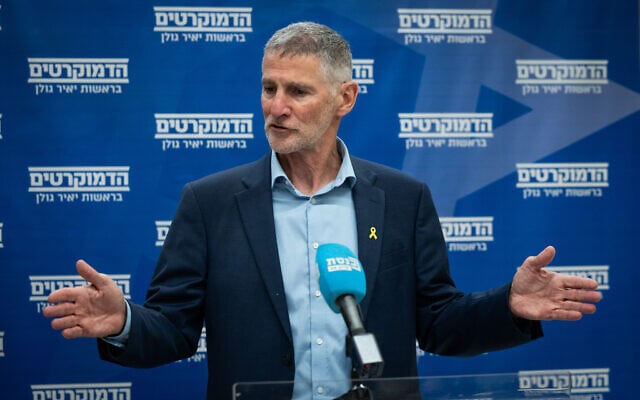 The Democrats chair Yair Golan leads a faction meeting at the Knesset, the Israeli parliament in Jerusalem, on May 19, 2025. (Oren Ben Hakoon/Flash90)
The Democrats chair Yair Golan leads a faction meeting at the Knesset, the Israeli parliament in Jerusalem, on May 19, 2025. (Oren Ben Hakoon/Flash90)Sixty-nine percent of respondents said they had not planned to vote for The Democrats and still do not.
Channel 12 did not specify how many respondents were included in the poll released Friday or provide a margin of error for the results.
Tel Aviv anti-government protesters rage at PM; Silent vigil for Gaza’s slain children swells in size
Anti-government, pro-hostage deal protesters in front of the IDF headquarters on Tel Aviv’s Begin Road start clearing off as the protest winds down following angry speeches from a former hostage and the parents of young men still held captive in the Strip.
During the protest, smokestacks were lit and chants of “Why are they still in Gaza?” could be heard, accompanied by drumming.
Einav Zangauker, mother of hostage Matan Zangauker, and Yehuda Cohen, father of captive soldier Nimrod Cohen, repeat their accusations from earlier this evening that Prime Minister Benjamin Netanyahu is abandoning the hostages.
Referring to Netanyahu’s statement this week that Hamas used cheap equipment including “flip-flops amd Kalachnikovs” in the onslaught of October 7, 2023, Cohen says, incredulously, that the premier thinks “Nimrod’s tank was taken over with flip-flops.”
Zangauker says that instead of reaching a ceasefire-hostage deal, the government “will continue sending our troops to the front, to create settlements on the backs of our hostages. They’ll continue sabotaging the country and shirking responsibility.”
“In order to reach a deal that will release all the hostages, we have to kick out this government,” she says.
Matan’s partner, Ilana Gritzewsky, who was released from Hamas captivity in the weeklong November 2023 truce, also speaks, demanding an end to the war and the return of the hostages. She tells the crowd she lost 11 kilograms (24 pounds) in captivity and was treated “like chattel that can be moved from place to place.”
The Begin Road protest, which appeared to draw over 1,000 people at its peak tonight, was bolstered by protesters from the earlier anti-government demonstration on Habima Square.
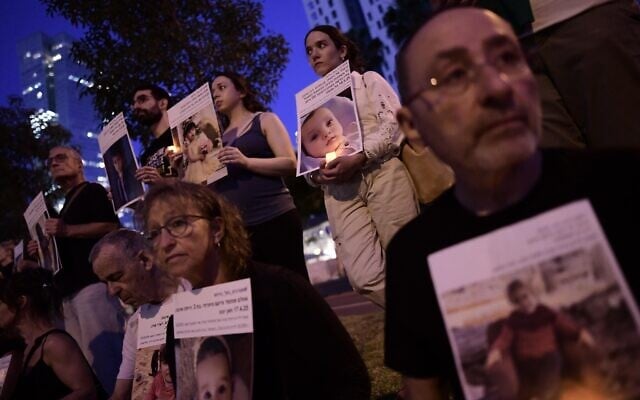 Activists hold up photos of children killed during the war in Gaza, during a protest calling to end the war, in Tel Aviv, May 24, 2025. (Tomer Neuberg/Flash90)
Activists hold up photos of children killed during the war in Gaza, during a protest calling to end the war, in Tel Aviv, May 24, 2025. (Tomer Neuberg/Flash90)On Kaplan Street, in between the two protests, left-wing activists stood in silence, holding up candles and pictures of children killed by Israel in Gaza since the fighting renewed on March 18.
Most of the photos feature the name of the slain child, as well as the date and place of their death. By contrast, the entrance to Begin Road from Kaplan boasts a large protest display featuring the names of Israelis killed during the October 7 Hamas onslaught.
The silent anti-war demonstration, which positions itself outside the IDF headquarters’ south gate, was noticeably bigger this week than in past weeks, with about 400 participants standing on the sidewalk and the traffic island in the middle of the street, whereas previously, they stood only on the sidewalk.
This week’s Kaplan protest comes after The Democrats chair and former IDF deputy chief Yair Golan sparked controversy by saying Israel was “killing babies as a hobby in Gaza.” Link
Anti-corruption watchdog chief says PM will have to recuse himself if he defies court on new Shin Bet chief pick
Eliad Shraga, head of the Movement for Quality Government anti-corruption watchdog, tells some 1,000 anti-government protesters at Habima Square that Prime Minister Benjamin Netanyahu will be forced to recuse himself if he defies the order of Attorney General Gali Baharav-Miara, based on this week’s High Court ruling, not to appoint a new Shin Bet chief, given the premier’s conflict of interest stemming from the security agency’s probe of his top aides’ alleged criminal ties to Hamas-backer Qatar.
Despite the orders of Baharav-Miara, whom the government plans to oust, Netanyahu announced this week that he would appoint Maj. Gen. David Zini to the role of Shin Bet chief
Addressing Netanyahu, Shraga, whose movement successfully petitioned the court to pause Netanyahu’s dismissal of incumbent Shin Bet chief Ronen Bar, says: “Remember, if you defy the ruling, and if you defy the orders of the attorney general, you’re on the way to recusal. You’ve been warned.”
Though Bar has announced he would resign next month anyway, the court considered the principle of his dismissal, and found it had been decided on in a flawed procedure.
Shraga calls the ruling “pivotal,” adding that “every future Shin Bet chief will sleep with it under their pillow.”
“The ruling determined that the Shin Bet head’s loyalty lies with the kingdom, not the king,” he says. Rising to a yell, he adds: “We will not allow the Shin Bet’s tools to be used against protesters” — something Bar said in an affidavit to the court that Netanyahu had pressured him to do.
The Region and the World
This article is difficult to read.
Acronyms and Glossary
ICC - International Criminal Court in the Hague
IJC - International Court of Justice in the Hague
MDA - Magen David Adom - Israel Ambulance Corp
PA - Palestinian Authority - President Mahmud Abbas, aka Abu Mazen
PMO- Prime Minister's Office
UAV - Unmanned Aerial vehicle, Drone. Could be used for surveillance and reconnaissance, or be weaponized with missiles or contain explosives for 'suicide' explosion mission
Join my Whatsapp update group https://chat.whatsapp.com/IQ3OtwE6ydxBeBAxWNziB0
Twitter - @LonnyB58 Bluesky - @lonny-b.bsky.social
Twitter - @LonnyB58




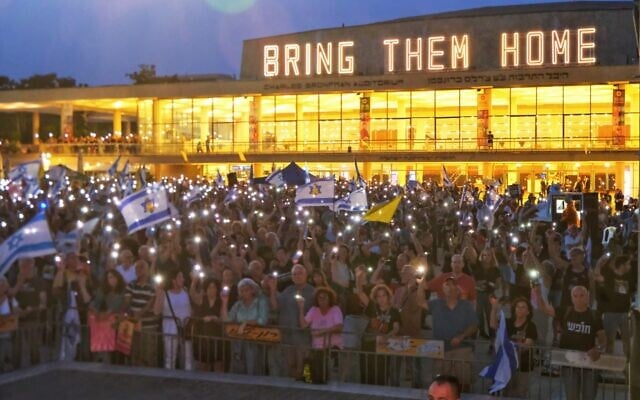




















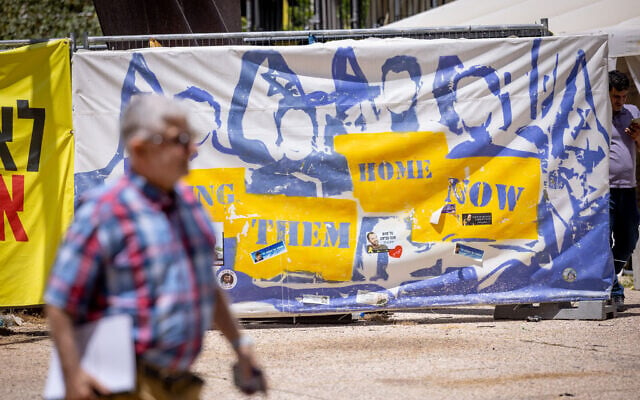










Comments
Post a Comment